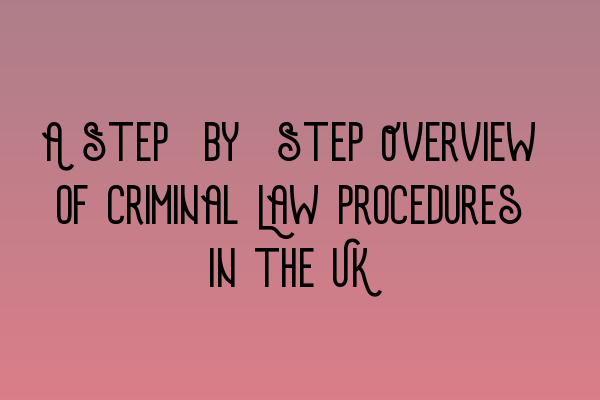A Step-by-Step Overview of Criminal Law Procedures in the UK
Welcome to our comprehensive guide to understanding the criminal law procedures in the UK. Whether you are studying for the SQE or simply interested in gaining a deeper understanding of criminal law, this step-by-step overview will provide you with the knowledge you need.
1. Investigation Phase
The criminal law procedure in the UK begins with the investigation phase. This phase is crucial in gathering evidence and identifying potential suspects. It involves techniques such as interviews, search warrants, and gathering forensic evidence.
If you’re looking for SQE 1 Practice Exam Questions, check out our SQE 1 Practice Exam Questions article for a comprehensive set of practice questions to help you prepare.
2. Arrest and Detention
If there is sufficient evidence to justify an arrest, the suspect will be taken into custody. During this stage, the police have the power to detain the suspect for questioning and further investigation.
3. Charging
Once the investigation is complete, and if there is enough evidence, the police will charge the suspect with a specific criminal offense. This is a formal accusation that initiates the legal proceedings.
If you’re interested in learning more about SQE 2 preparation courses, our SQE 2 Preparation Courses article provides detailed information on the available courses to help you succeed in the exam.
4. Bail Hearing
After being charged, the suspect may have the opportunity to apply for bail. A bail hearing will be held where a judge will decide whether the suspect should be granted bail or remain in custody until the trial.
5. Plea Negotiation
In some cases, the prosecution and defense may engage in plea negotiations. This is where the defendant agrees to plead guilty to a lesser offense in exchange for a reduced sentence.
6. Pre-Trial Proceedings
Before the trial begins, various pre-trial proceedings occur. These include the disclosure of evidence, witness statements, and any legal arguments that may impact the trial.
7. Trial
The trial is the central stage of the criminal law procedure. It is where the evidence is presented, witnesses testify, and both the prosecution and defense make their case before the judge or jury.
If you’re looking for SQE 1 preparation courses, our SQE 1 Preparation Courses article will help you find the right courses to maximize your chances of success.
8. Sentencing
If the defendant is found guilty, the court will move to the sentencing phase. Here, the judge determines the appropriate punishment, taking into account several factors such as the severity of the crime and the defendant’s criminal history.
9. Appeals
If the defendant or prosecution is unhappy with the outcome of the trial or sentencing, they may choose to appeal the decision. The appeals process allows for a higher court to review the case and potentially reverse or modify the original decision.
For up-to-date information on SRA SQE Exam Dates, please refer to our SRA SQE Exam Dates article.
Conclusion
Understanding the step-by-step criminal law procedures in the UK is essential for anyone studying criminal law or working in the legal field. We hope this comprehensive overview has provided you with valuable insights and resources to deepen your understanding.
